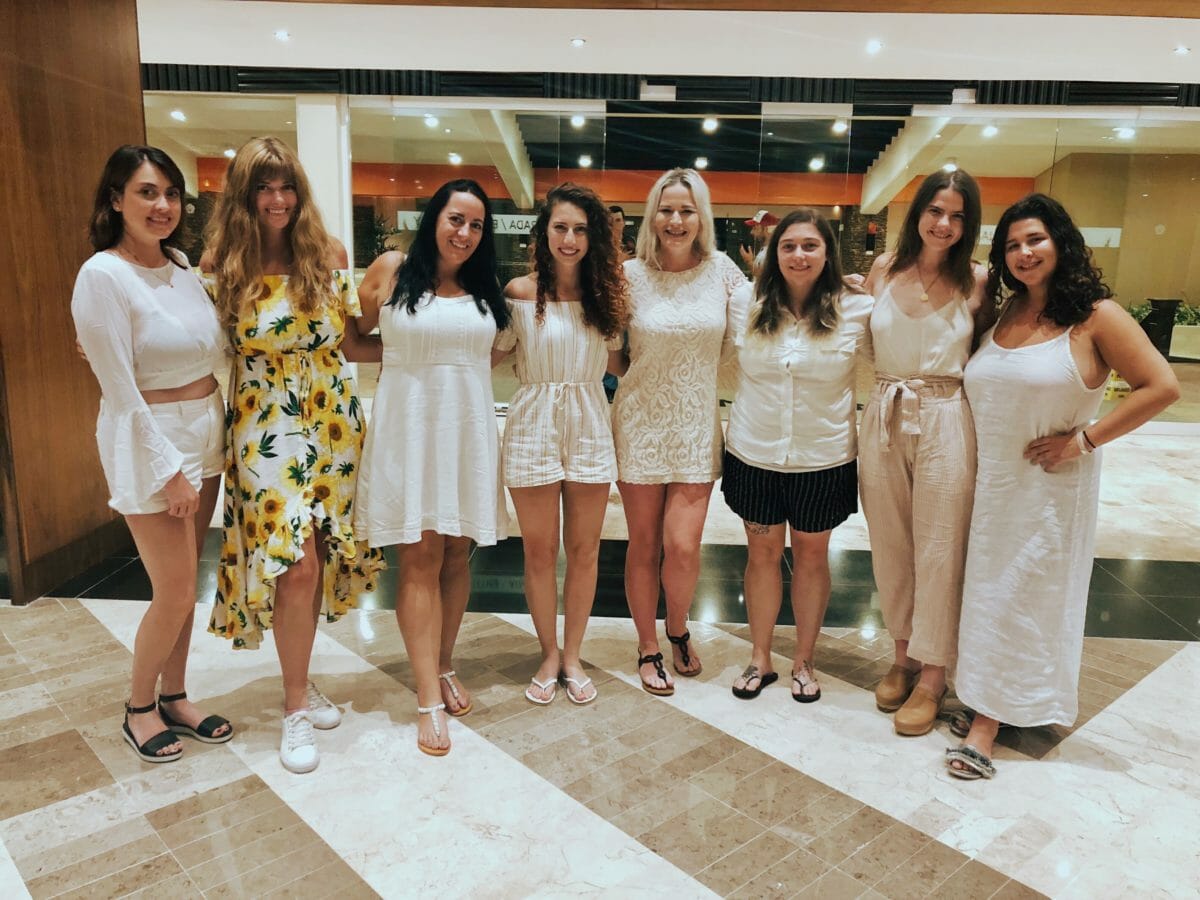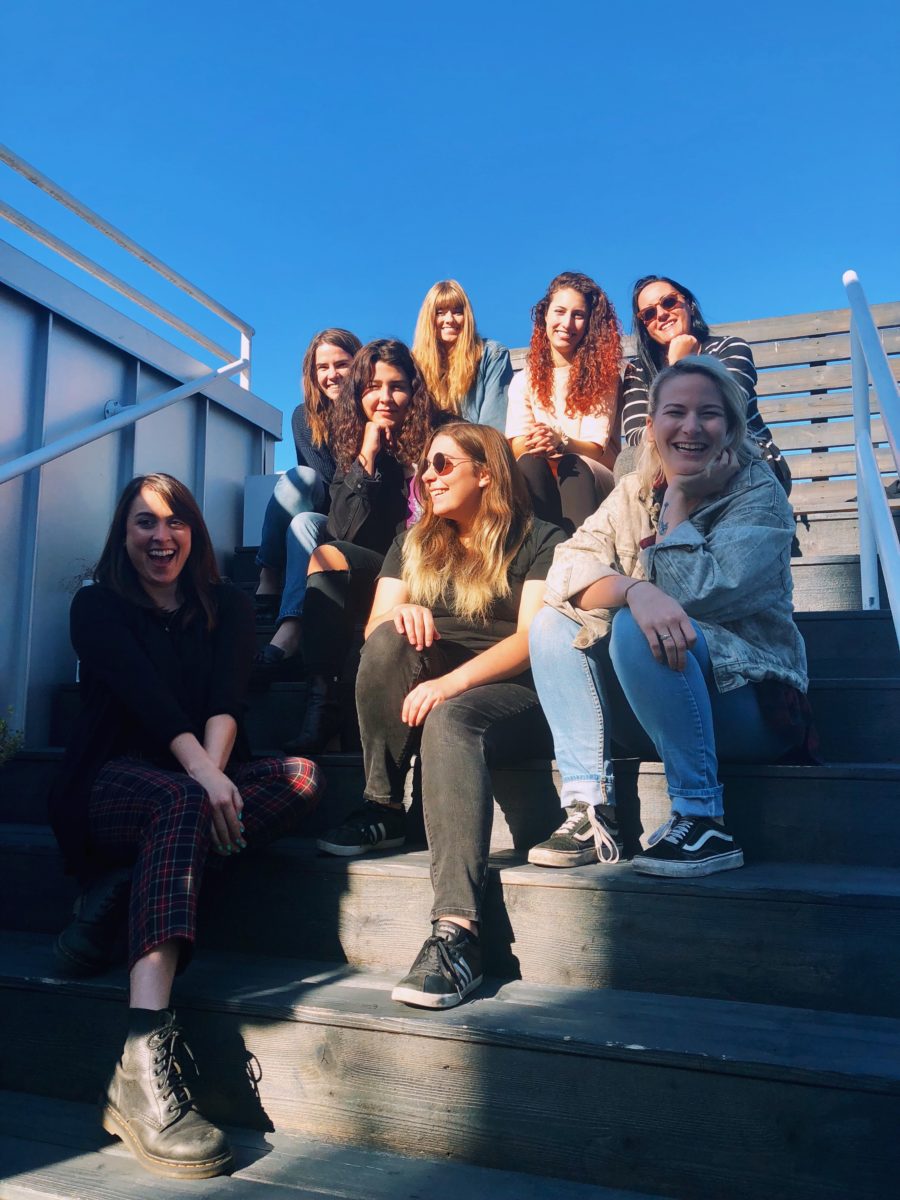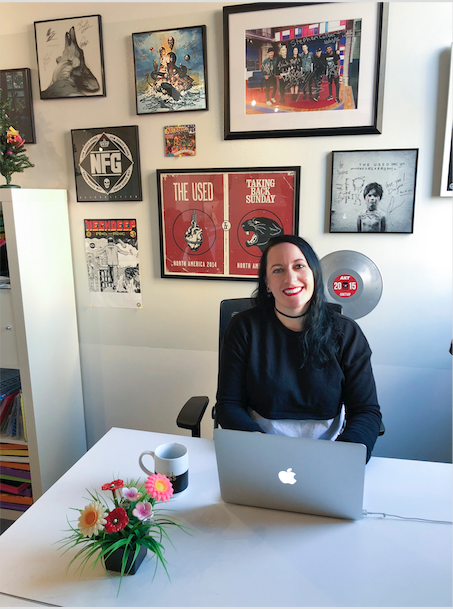Everyone always has a story to tell. As someone that has been writing about music for nearly a decade now, I can’t even begin to recollect the amount of stories I have told through writing. Most notably, that comes from an artist looking to discuss new music, reflect on the past, or really any variety of different angles that could be taken. One of the more underestimated parts about getting these stories out there, is the people that work behind the scenes — outside of just the writer and the subject of the interview/feature. There’s a lot of moving pieces in this, but the first one typically comes as an interaction with an interviewee’s publicist.
That leads us to the main point of this specific article, and instead of focusing on a new album, it’s time to focus on someone who has put together an incredible resume for themselves and their company. While you may be unfamiliar with the name, I can tell you that they have worked on more of your favorite alt/scene/punk records than you are currently aware of. But it’s not just that impressive resume that lead us to this piece, instead it was more so the incredible woman that is at the center of it all: Big Picture Media’s Dayna Ghiraldi-Travers.
She founded Big Picture Media back in 2007, and has since worked with artists like Thrice, Circa Survive, New Found Glory, Taking Back Sunday, Neck Deep, and many, many more. But again, that’s only half of the tale. To really explain how she lead Big Picture Media to its current powerhouse status, we have to go back to the very beginning — and no, not just the beginning of BPM 11 years ago, the beginning of her career as a music publicist.
Her desire to work in music came at a young age, and it’s almost always been a part of who she is. Ghirarldi-Travers tells me of when she discovered her love of music, “I’ve always been a dancer, so early on. My brother was really into music, he was like an industrial kid who was in and out of bands, playing guitar and playing keys, you know he was like goth. I didn’t go that route, and he made fun of me for all of the music that I loved, but he did take me to my first concert, which was a Green Day show when I was 12.” In fact, it’s that Green Day concert that she describes as “The most life-changing thing that I’ve ever done. I was already a cheerleader in score, but I was like the cheerleader girl who wore my Green Day and punk-rock shirts over my uniform. I definitely played both sides really well, but that was the kind of music that I really gravitated towards.”
Ghiarldi-Travers continues on to explain a time in her youth when she was growing up and going to parties with friends, making them listen to music that she loved, “I was like, ‘Do you feel that? Do you hear that?’” Her parents also spent some time in bands, and while nothing ever came of it, it was something that was there in the back of her mind. From a more educational standpoint, she did drama, and always sang in chorus. She recalls memories of being at concerts, watching music industry people running around and working, pondering “‘What do they do?’ I might as well have tried to become an astronaut,” she shares.
Turning that youthful love of music into a career, though, required some work. Ghiraldi-Travers humorously shares with me that her first “music related’ job was as a dancer for a DJ company that did Bar Mitvah’s on Long Island, before moving onto the more typical route: internships. It started out with Island Records and interning in their A&R department, providing her with her first music industry taste, and then moving on to intern at another New York City firm, Network Management. “I chose Island Records because of Thrice, then I chose Network because of Brand New and Sum 41. I was just such a huge fan, that I would open up the CD book and see what label these bands were on, what management companies they had, and I would just try that,” she tells me on how she chose these internships.
This was back in the early-2000s, and though there were more tedious parts of the job, such as calling record stores across the country and finding out what bands sell in their region, Ghiraldi-Travers goes on to share with me the surprising amount of power she had for being an unpaid intern. “I couldn’t believe the music that I would be in charge of listening to, if I thought it was good, it would get passed through and it would go to the top,” she begins to explain, “Then I would be in charge of opening all of the unsolicited mail and listen to all of these CD’s, and rating all of these press kits. Back then, all of these bands had black and white press photos. I was like the first line of defense, I would be the first person that was sort of like a shock collar like ‘This is good enough to move through, this is in the trash pile.’ So even then, I couldn’t believe they’d let someone that was an unpaid intern have this power. That sort of gave me hope.”
When it was time for paying jobs out of college, Ghiraldi-Travers started out as a junior publicist at a small PR agency, stayed there for 6 months, and then moved onto the bigger agency, Press Here. Here, she worked for more than two years, and it wound up as an experience she still remains grateful for. “I learned under some of the best music publicists that are still in the industry today, who I loved,” she highlights on her experience. While there was no shortage of great clients being assigned to her, these weren’t ones that she was ultimately passionate about.
There’s a specific moment and project that comes to mind when discussing her experience at Press Here and what lead to her leaving. The story starts with how she landed the debut solo record from Thrice’s Dustin Kensrue, Please Come Home. Kensrue and his manager at the time came into Press Here to meet with Ghiraldi-Travers and her boss. While she had thought the meeting went well, her boss expressed doubts on her landing the project: “The meeting was over and my boss was like ‘Well, that was nice to meet them, but you’re not going to get that project. You know, you wear your heart on your sleeve, you were too overeager.’ I was broken down, but I ended up getting the project,” she recalls. It was that original doubt — and being a huge Thrice fan herself — that lead to working on that record around the clock, landing some night late-night TV gigs (uncommon for bands in the alternative/punk scene at the time), and this success lead to Thrice coming back and asking for Ghiraldi-Travers to work their next full-band record. “My boss was like ‘Oh, well [the label] can’t pay enough, so you have to ask the band to pay out of pocket’ to make your fee. And I was like ‘No,’ I don’t care how much money they have,” she explains. This was the straw that broke the camel’s back for Ghiraldi-Travers, as she soon left Press Here.

Ghiraldi-Travers on set of ‘The Late Show’
Looking back on it with me, though, Ghiraldi-Travers acknowledges that she views this situation differently. “As a business owner, I understand, it was probably strictly financial and when you have salaries, electricity bills, wi-fi, staff that drink a lot of water, there were these other expenses that I wasn’t thinking about as just a young publicist, but looking back now I’m sure she was taking all of that into consideration, and in her mindset was like ‘Well, you’re worth more than this. You should be paid what you’re worth,'” she states.
Due to a clause in her contract with Press Here that stated she couldn’t own a PR agency in New York City (or work at a competitor), she moved to Massachusetts with her now-husband, and started Big Picture Media with a laptop and cell phone in her 100 square foot office in their Massachusetts’ apartment. After 3 months had passed and she was legally cleared to work back in NYC, they packed up and moved back into the city. Right out of the gate, she had a stacked roster of clients: Thrice, Circa Survive, City and Colour, The Receiving End of Sirens, and To Write Love on Her Arms — who is still with Big Picture and serves as their longest-tenured client, even going back to two years with Ghiraldi-Travers at Press Here.
As someone that works with Big Picture Media fairly frequently, I can tell you that Ghiraldi-Travers and the overall company are an incredible example of how women can work this music industry just as well as anyone else. While the music industry has long been dominate been dominated by men, she explains to me that she doesn’t recall any moment where she had to overcome any extra hurdles due to being a woman. “I can’t really say that I have,” she begins to explain on if she ever did have to work harder due to being a woman. “And I don’t mean that from a factual stand point. Perhaps I did and I was blind to it, because I have tunnel vision and like — I really do have blinders on, and when I set out to do something, I truly will stop at nothing to do it.”
She continues to expand on this notion, “If there was something in my way, I probably stepped right over and just was like ‘Oh, I didn’t realize’ like I’m oblivious. I am obsessed in a good way, like I was so nervous early on that this wasn’t going to be something that I was able to do, because it almost seemed too good to be true. Back then, there weren’t 600 PR agencies like there are now, and there weren’t agencies that focused on this type of music. So I do think, in a way, I had the client roster the helped me prove myself, and I worked so hard and I respected everyone in a way that I think is kind of rare.”
Her current full-time staff at Big Picture Media consists of 8 female publicists, and though we had just discussed her experience as a woman in music, she shares it wasn’t intentional to have a full-time staff that consists of only women. “I’m always hiring because I want to find the right people, and I want to make sure the people who are here truly represent the company to the core and the values that I believe in. To me, it’s not something necessarily something that I sought out to have all female publicists, it just has worked out that way. We’ve had plenty of male employees, and my husband is actually the general manager of the company—he’s just not a publicist,” Ghiraldi-Travers shares. Acknowledging that they have had plenty of male employees, interns, and publicists before, the hiring criteria is just a matter of what they need at the time. However, one thing never changes, as she shares “I’m a huge fan of hiring from within. Our intern program is incredibly competitive at this point, like, we get 100+ resumes each semester and probably interview around 40 and take 10. From there, you are like a star intern, I love you and I hire you. Becky [Kovach, publicist] was an intern, she’s been with me for over 5 years. I’m really good at hunting the talent and what I’m looking for. I get a lot of people like, ‘how do I work there?’ and I’m like, Well, intern!'”

The Big Picture Media team in Cancun
Big Picture Media is a special place, if you ask any of the interns, publicists, or even any clients that have worked with the team over the years. So when speaking with Ghiraldi-Travers, I wanted to get her opinion — coming from the top — as to what contributes to this reputation. She provided a detailed answer on what this is, but one of the things that sticks is out is her acknowledgment of how difficult the music industry can be to work in, and to not take that for granted. Look no further than just a couple paragraphs ago, when she explained the amount of applicants for interns vs who actually becomes an intern. It’s a highly competitive industry, that might not always be for everyone — and weeding those people out, is a skill that develops over time. One thing that she looks for is positivity when putting together her staff, with the mindset that this is necessary to put out quality work. However, it’s also partly for her own sake. “If you’re going to come to work every day and throw your bag down and huff and puff, and put toxic energy in the air, I cannot surround myself with people like that because I really am a product of my environment and I take that on, I’m a fixer. If you’re like that, I can’t do anything but to channel all of my energy to you, like how can we fix this? And I can’t do that, no one has time for that,” she shares. She looks for passion, commitment to learning and growing, as well as full transparency. This transparency is a big part of their working environment as Big Picture, as they all work together, talk every day, and make sure everyone succeeds. Ghiraldi-Travers summarizes her thoughts by saying that “It’s really building a positive team and a family spirit and embracing one another’s successes and to be sincere and supporting one another. I want them to feel creative, and as much as I give them the guidance and the strength to grow and learn, I want them to be themselves.”
In fact, I did ask some of her publicists about this — and other things, later — notion: what is it like to work with Ghiraldi-Travers? What makes Big Picture Media so special, and how much has she taught you? “There is no bare minimum. Every campaign deserves full attention. I guess summed up could say ‘If you aren’t gonna do it right, don’t do it at all,'” explains senior publicist Natalie Schaffer on what she has learned from Ghiraldi-Travers. Kovach, another senior publicist also states that she has learned “Your passion is your biggest asset. If you love what you’re working on, and let it come through in your work, people will notice and appreciate it.” Additionally, junior publicist Annie Skertic shares that Ghiraldi-Travers “Has taught me that hard work, dedication, compassion, and kindness go a long way in this industry. She is not only the most intensely dedicated boss I’ve had, but her passion for her work alone speaks for itself. Dayna’s compassionate energy has taught me that if you treat people right, work endlessly hard, and stay committed to your vision, you can succeed at whatever you put your mind to.
“I think our transparency and communication style is what makes BPM so special to clients. Between our reports and daily correspondence with clients, we kinda lay it all out there on line so they know what’s going on at all times,” publicist Hayley Brinkman chimes with the notion of what makes Big Picture Media stand out to clients. “We’re also able to get to know our clients on a much more personal level when we’re talking to them all day everyday. I think it means a lot to them to see that we’re actual people that care about their art, rather than just robots tossing out their music to a bunch of blogs.” When speaking with her publicists, this is a frequent thing that comes in: the amount of honesty, respect, and true love for music is what their culture is like, and that comes through on the work that they do. “We actually, truly, care about each client. We love our bands, they are literally our favorite bands. This place is full of genuine people,” adds Schaffer.
As you can tell, Big Picture Media is in an incredible place, one that has played a pivotal role in the alternative/punk scene for many, many years. They have brought clients that range from newer, upcoming bands, to older, established, bands that have established their legacy. We’re talking about a range that goes from the newer generation of pop-punk bands, in particular, like Neck Deep, As It Is, State Champs, to the “older” generation of pop-punk bands like Sum 41, New Found Glory, Bayside, and more. These are just their current clients, as previous clients have included Warped Tour, Senses Fail, Silverstein, All Time Low, and more. Even outside of this little corner of the music world, they have also had clients range from Imagine Dragons, to Everclear, to Matisyahu, to Kansas, and many more. While Ghiraldi-Travers has a long-lasting love affair with the more underground scene, it’s their flexibility and diversity that has really played a pivotal role in their success. “What makes [Big Picture Media] special is that we have diversified so much and we have publicists that have different music tastes, and you want publicists to work on stuff that they want to work on. You only want a publicist who’s passionate,” she explains. “It’s been nice to bring on publicists that want to work on film or with comedians or do events. We’re working on Sony Classical, we just did the soundtrack and score for Venom, Creed 2, and Robin Hood. This year we did a Wine Experience festival, we did the LA and the NY coffee festival. We did events with David Hasselhoff festival and a guitar festival. We did so much insane stuff outside of music.”

The Big Picture Media team
When talking to one another, there comes a point when the conversations moves into a more retrospective and reflecting one. The first thing that comes up is discussing how much the music industry has changed in her time as a publicist. Of course, the changes at face value are obvious: streaming services, the rise of illegal downloading, decline of music sales, disappearance of CD’s, and so forth — the things that everyone talks about. There was no doubt in my mind that how publicists did their job had changed as well, ad Ghiradli-Travers recollects spending 5 hours sending out faxes of press releases, and while now there is a database called Cision (formerly Bacons) that publicists pay for to get contacts across the world, it didn’t used to be as easily accessible. “Back in the day, they used to send this, almost like encyclopedia book of journalists and where they worked. If you needed to find a music writer in Oklahoma, you would flip through this book. Now you just type it in and get real life updates. Books would only ship quarterly. I used to flip through books and do calls for hours,” she shares with me. Of course the aforementioned decline of CD’s has affected has affected listeners and artists, but also changes how publicists send music. “Press mailing, mailing out a 460 piece CD, press release, bio photo. Printing the labels, it was so time consuming. That definitely has changed. I don’t even have a CD player anymore! My laptop doesn’t, my car doesn’t,” she begins. “Now I don’t send music to people who don’t want to hear it. Back then, I would send it to anyone and everyone and hope they hear it. Now if you don’t care and you don’t wanna listen to it, I’ll pitch you for it, but I’m not gonna send it to you.”
In the spirit of reflection, we got to talking about her favorite project that she has worked on. The first one that comes to mind is the most recent Neck Deep record, The Peace and the Panic. “I feel like that record was something that was very tough for a band. His father had just passed. It was very heavy and I wanted to explore and get deep in the process. I’ve been with them from the very beginning, I know what makes these guys tick. I knew they were in a very different place and I wanted them to open up to me,” she shares, before moving on to share the same sentiment about The Used, having worked with them for six years. There’s a responsibility that she feels she has, of being the band’s voice and having them put everything into these records — the hardest ones of their life to write — and making the most of it. Then there’s the Sum 41 record, in which Deryck Whibley has an incredible story to tell. In 2014, he was hospitalized for alcoholism, having drank himself into a coma — the damage was severe, forcing him to have to re-learn how to walk, talk, and re-gain motor skills. All of that is reflected in their comeback record, 13 Voices, which was released back in 2016. Ghiraldi-Travers recollects a memory of meeting up with Whibley and their manager at Warped Tour, and despite his outspoken, energetic nature on stage, she discovered Whibey is more soft-spoken and gentle behind the scenes. They talked about the record, and what his biggest goal was and what he really wanted to accomplish: “He said he would love to do Stephen Colbert. And I was like, okay, band’s like Sum 41 do not get on Colbert, but I swear I’m going to make this happen. And the next day I called the booker and I told her this whole story and I sent her three songs and she was like, ‘We love this, we want them.’ I have an email from Derek that I have framed next to my desk. After the show, we took a photo on stage with the band and Stephen. They had it custom framed and signed and sent it to me and it’s hung behind my desk,” she explains.
There’s also a point in which Ghiraldi-Travers highlights Emo Nite and the success that has come out of that. While it has been copy and pasted all across the country, in every city that houses enough former scene kids to re-live their youthful days, there’s something special about the original. “I went to the second Emo Nite that ever happened. I remember going in and being like, ‘Oh what is this? This is so cool!’ The next day I sat with TJ Morgan and was like ‘We should talk, I’d love to get my bands involved.’ Four years later, we’re still talking together and it’s bigger than ever. When I look at the press pack for Emo Nite, I surprise myself. Massive features and Nylon and Vogue, and I’m like, how did this come to be? I’m really proud of Emo Nite.”
On the flip side, I talk to Ghiraldi-Travers about if there are any projects that maybe didn’t go as planned, or didn’t quite work out the way that was intended. There are no specifics mentioned, but she does explain there have been situations where they’ve had to deny or leave projects for ethical reasons, or having one of her publicists reach out and express why they think a project isn’t a good fit. For Big Picture Media, she mentions that integrity is big to them, and money isn’t going to be enough to push them into doing a project that they can’t get behind, ethically or for whatever else it might be. However, on the subject of ending a project just because it isn’t going as planned, she shares that they usually are able to work through those things to get the desired result. “I feel like at the end of the day there’s never enough hours in the day to be a publicist, but I think a lot of it comes down to being a creative thinker and giving it all you’ve got. Even if there’s a project that’s not going great, I do believe in my heart that you can turn it around. Sometimes I’ll step in to projects to help out with the pitching or changing it or maybe there’s a different journalist to talk to or a different photo to use, there’s always a way to figure it out. Even in the end, I won’t stop working until the client is happy,” she highlights.
Towards the end of our conversation, I throw some questions at her that I knew would get an amusing story out of. Publicists are truly the unsung hero of the music industry, and I don’t say that just as a writer doing an article on a publicist, I say that as someone that came into the music industry 9 years ago with no knowledge on how things worked, and immediately being blown away by how much a publicist handles and juggles. “No one knows what I do. My parents don’t even know what I do. When I say I’m a publicist, people think I work in publishing,” Ghiraldi-Travers begins to share, “I try to explain it, like, early on in my career my parents would be like, ‘Oh, you’re gonna be on TV tonight’ and it’s like, no, I’m not gonna be on TV.” She states that publicity isn’t crazy all of the time, as it just comes down to being incredibly organized and having to multitask.
“I think people think of Entourage and they think of that publicist. There have been many days and many red carpets and many moments where I’m like, ‘Oh my god.’ I remember being on this red carpet for this organization we did press for called Only Make Believe. It’s this beautiful organization where celebrity actors come in and perform small plays for terminally ill children in hospitals, so we were doing press for that and on the red carpet. I was probably eight and a half months pregnant, New York City in December outside. We were waiting for Sir Ian McKellen to show up. This guy was yelling at the rest of the talent, and I don’t know if it was because I was having a moment of rage, but I was like, ‘Get out of here. You’re kicked off the carpet’ and he was like ‘Who the fuck are you?’ There are so many crazy moments. I could think of 600 moments where I’m like, ‘How is this my life?’ We just did this event with David Hasselhoff. We did an event [in November] with Billy Joel and I walked him down the red carpet.”
In terms of looking towards the future, Ghiraldi-Travers has big plans for the future. as well as a wish list for future clients that includes blink-182, Green Day, Paramore, or some of those iconic staple bands. While she is candidly aware of the small likelihood of these happening, she would also like to take on an artist and develop them. “I met this girl that sent me demos over the summer and we’ve been going back and forth, but she’s not really ready. I’d love to meet a band and help them, that would be incredible,” she shares. There’s also a desire to do more events company-wide, diving more into comedy, and just getting one of her own films out into the universe, and taking on additional clients that they are passionate about and make sense. All of that aside, none of these things prevent her from being excited with the clients that are actively on Big Picture Media’s roster and have upcoming projects that will be coming out. “I know I’m going to have a big year, all of my staple bands have albums coming out this year or next year. This last year was awesome, but I didn’t have anything really massive.” She also shares excitement for upcoming records that they’ll be working on from Sum 41 and Have Mercy, while also expressing eagerness to work with new clients State Champs and The Story So Far.
Earlier, Ghiraldi-Travers mentioned that the publicist life isn’t chaos non-stop, even though the hours are late and they’re never really off the clock, so to speak. So outside of being a publicist, it shouldn’t come as too much of a surprise that she tries to be as normal as possible. “My daughter is the life blood of me, we just hang out. The kid loves music, she loves to dance, she loves singing, she loves performing,” she states before sharing the work balance with her husband, “My husband is the GM of Big Picture, but he’s also a screenwriter and producer. I’ve helped with styling and producing. We’re in pre-production for two of his next projects, so we definitely carve out time for that. We do that for probably three or four hours a night a few times a month.” Not only that, but like most people, she has a strong affection for Disney, “I love Disney and everything Walt Disney World. My two internships prior to Island and Network were actually at Disneyworld in their program. I got my mousters and my ducktorate at Disney University. That was my first experience and taught me work ethic. To this day, I love everything Disney. I hand make my own Mouse ears from nothing,” she shares before we side-track a bit on my lack of ever being to any Disney park, and her utter disbelief in this fact.
This also comes up when speaking with her staff, as well — and in full transparency, it was something that was mentioned when I first spoke with Ghiraldi-Travers’ assistant/publicist Katy Cooper. “I met Dayna when I was still working for Disney. If it wasn’t for that mouse, I wouldn’t be at BPM. It’s a true love and forever bond,” she shares. Kovach adds, “Dayna loves Disney more than anyone else I’ve ever met. Maybe even more than I love Yellowcard, and that’s saying a lot.” Schaffer reiterates this point, exclaiming, “She has a Disney tattoo! That is love, man.”
All of this is to say that, while the job of publcity may be coveted (as evidenced by the amount of intern applications), and the job can be rewarding while also other times being stressful, these very much so are just regular people. They like the same things — Disney here, for example — and are still, in this case of Big Picture Media, incredibly big fans of music.
While speaking with me, Ghiraldi-Travers shared her sentiment that she doubts publicists will ever get the recognition that they deserve. Perhaps that is the case, and while I could do many, many pieces like this on publicists, what Big Picture Media has accomplished is not rivaled by many. For this specific company, it was founded by a woman with unrivaled work ethic who took the ultimate bet on herself and her abilities, and it paid off in the best way possible. The music industry is sometimes a thankless job, and it’s a beast that doesn’t always suite everyone, but this is the story of how one New York City woman knocked on its backside and took it by storm. There’s no turning back, no end in sight, and not even the slightest signs of slowing down.

You can keep up with Big Picture Media on their own site, Facebook, Twitter, and Instagram.













